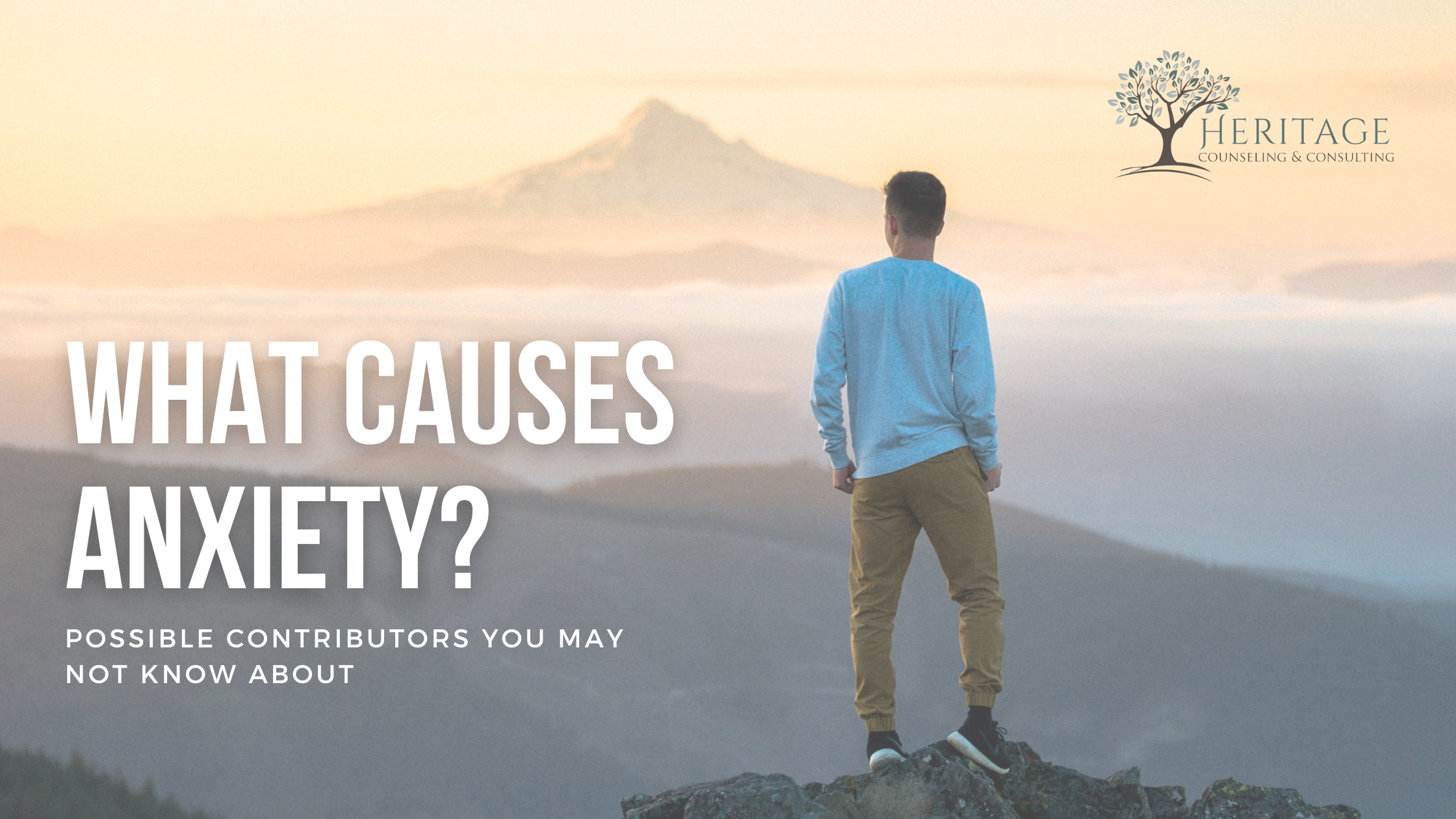Introduction
Anxiety is a normal human emotion. The feeling of nervousness before an important event may contribute to anxiety. However, when the feelings of anxiety and fear are excessive, uncontrollable, or persistent and cause serious problems in your day-to-day life, it may be a sign of an anxiety disorder. There are many causes of anxiety, and we’re diving into the most common causes and what we see the most at Heritage Counseling.
Genetics
The role of genetics in anxiety is a complicated one, but it's becoming increasingly apparent that genes may play a role in how your body responds to stress. If you have a family history of anxiety and other mental health conditions, you're could be at a higher risk for developing them yourself.
However, it's important not to jump to conclusions about the causes of your anxiety without consulting a medical professional. Genetics may be one factor contributing to your condition—or they may not be at all involved, depending on other factors like how the brain physically develops over time and environmental influences such as trauma exposure or abuse during childhood development.
Stress
One of the most common contributors of anxiety is stress. Stress can come from any number of sources: work, family, school, or relationships. Your environment can also be a source of stress. For example, if you live in a city with terrible traffic and overcrowded sidewalks and streets, this could be stressful on its own. Similarly, if you are living in an area that has frequent natural disasters like tornadoes or floods, this could also be considered stressful because there is always the possibility that it could happen again.
Additionally, we all have some sort of relationship with ourselves--whether we like it or not! And sometimes, even just thinking about the way we think can lead to feelings of anxiety caused by overthinking and we may become overwhelmed. Our minds are complex creatures who do not always do what we want them to do, sometimes they run wild on their own accord which can cause us unnecessary distress if left unchecked.
Anxiety Disorders
Anxiety disorders are the most common mental illness in the United States. They include panic disorder, social anxiety disorder, generalized anxiety disorder, and post-traumatic stress disorder (PTSD).
These disorders often occur together and are seen to impact women more than men. Symptoms of these disorders include a racing heart, sweating, trembling or shaking (tremors), dizziness nausea, and chest pain. Anxiety disorders can be seen in various forms and it is vital to have coping skills on hand when one may begin to feel anxious or overwhelmed.
Medications
Medications can also cause anxiety. Side effects of medications may include a faster heart rate, sweating, and dizziness. These side effects are usually not serious, but they can make you feel anxious or even more anxious than before you took the medicine. This is called an “adverse effect” of the medication.
Avoiding side effects can be difficult because each person reacts differently to different medicines and dosages. Talk to your doctor about how to manage any unwanted effects caused by your medications so that you can still get the help you need without feeling anxious. If you are taking medication and experiencing anxiety, Heritage Counseling offers Neurofeedback Therapy, which is a non-invasive way of training the brain to control mental health symptoms such as anxiety.
Caffeine
Caffeine can contribute to someone feeling more anxious. The anxiety-inducing effects of caffeine are one reason why some people find that they need to wean themselves off caffeine gradually. In contrast, others can handle a cup of coffee or tea at any time throughout the day. If you experience anxiety after consuming caffeine and have never considered it a cause for your condition, it's worth talking with your doctor about it. If you feel that caffeine is a must for you, try Green tea or Gensing tea to provide the impact of caffeine without the crash.
Caffeine increases the effects of other medications that cause anxiety. Other medications such as benzodiazepines (such as Xanax), beta-blockers (such as Inderal), and antidepressants may be prescribed to reduce feelings of worry and unease caused by chronic conditions such as heart disease or depression. Drinking too much coffee or tea could make these drugs work less effectively because they are processed through the same pathways within the body—and this can produce an increase in symptoms instead of relief from them!
Substance abuse
You may be wondering if your substance use is contributing to your anxiety. If you're experiencing symptoms of anxiety, it's important to get help from a mental health professional. Your doctor can help determine whether there are any underlying causes of your anxiety that need treatment, and they may recommend talking with a therapist or counselor.
In addition to treating the symptoms of anxiety disorders, therapy can provide education about how using drugs and alcohol can affect your brain chemistry differently than it does in healthy people—and in some cases, cause more severe effects on those who have an existing condition like depression or anxiety.
Anything that causes you stress can make you anxious.
Stress and anxiety are both types of stress. They're closely related, but not the same thing.
So what is stress? Stress is a biological response to any situation that challenges us in any way. It's normal for people to experience some degree of stress regularly—it happens when you're trying something new, or during important exams or interviews at work. But too much stress can lead to anxiety, and vice versa: anxiety can also make you stressed!
Conclusion
Anxiety can be caused by several factors, but the most common are genetics, stress, and anxiety disorders. Medications and caffeine can also cause anxiety in some people, while substance abuse is another common cause of anxiety that should always be considered when looking for ways to reduce your symptoms. When it comes to managing your anxiety, help from a licensed therapist may be your best option. A therapist can spend time with you to go over any lifestyle changes that could help, as well as provide additional support and helpful tools for your specific situation. At Heritage Counseling, we have a wide variety of therapists and counselors and treatment modalities available to help with managing anxiety. To find the therapist right for you, look at our Team page or call us at 214-363-2354 so our administrative staff can pair you with a therapist that best fits your needs.

